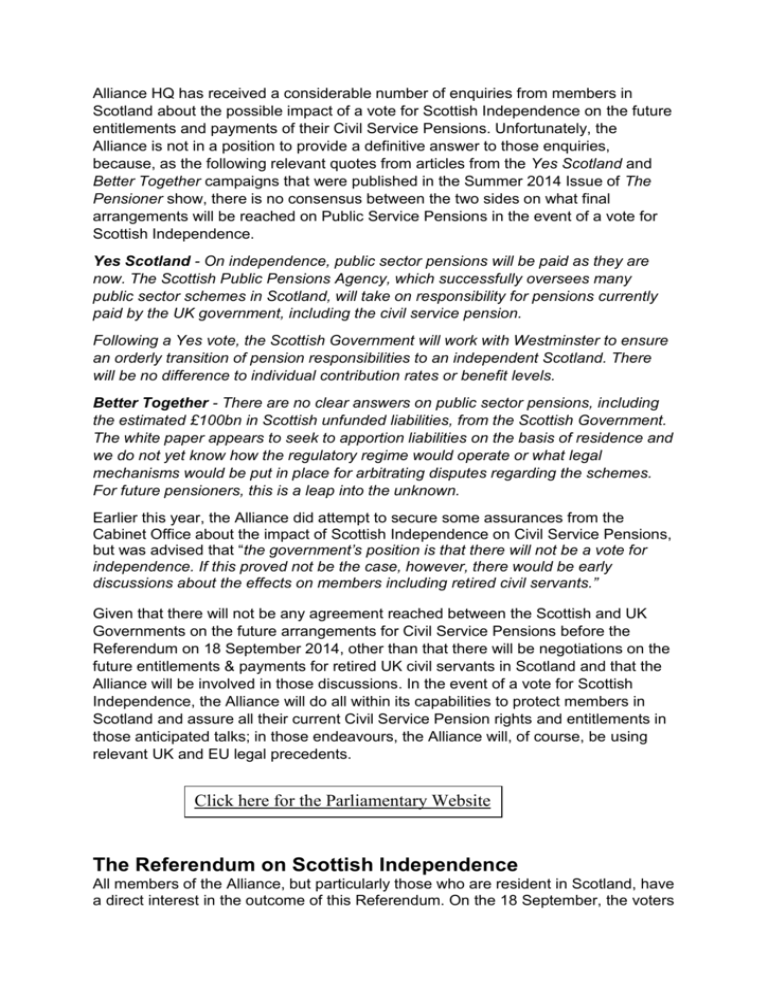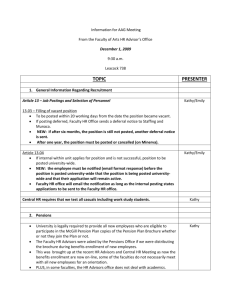Alliance HQ has received a considerable number of enquiries from
advertisement

Alliance HQ has received a considerable number of enquiries from members in Scotland about the possible impact of a vote for Scottish Independence on the future entitlements and payments of their Civil Service Pensions. Unfortunately, the Alliance is not in a position to provide a definitive answer to those enquiries, because, as the following relevant quotes from articles from the Yes Scotland and Better Together campaigns that were published in the Summer 2014 Issue of The Pensioner show, there is no consensus between the two sides on what final arrangements will be reached on Public Service Pensions in the event of a vote for Scottish Independence. Yes Scotland - On independence, public sector pensions will be paid as they are now. The Scottish Public Pensions Agency, which successfully oversees many public sector schemes in Scotland, will take on responsibility for pensions currently paid by the UK government, including the civil service pension. Following a Yes vote, the Scottish Government will work with Westminster to ensure an orderly transition of pension responsibilities to an independent Scotland. There will be no difference to individual contribution rates or benefit levels. Better Together - There are no clear answers on public sector pensions, including the estimated £100bn in Scottish unfunded liabilities, from the Scottish Government. The white paper appears to seek to apportion liabilities on the basis of residence and we do not yet know how the regulatory regime would operate or what legal mechanisms would be put in place for arbitrating disputes regarding the schemes. For future pensioners, this is a leap into the unknown. Earlier this year, the Alliance did attempt to secure some assurances from the Cabinet Office about the impact of Scottish Independence on Civil Service Pensions, but was advised that “the government’s position is that there will not be a vote for independence. If this proved not be the case, however, there would be early discussions about the effects on members including retired civil servants.” Given that there will not be any agreement reached between the Scottish and UK Governments on the future arrangements for Civil Service Pensions before the Referendum on 18 September 2014, other than that there will be negotiations on the future entitlements & payments for retired UK civil servants in Scotland and that the Alliance will be involved in those discussions. In the event of a vote for Scottish Independence, the Alliance will do all within its capabilities to protect members in Scotland and assure all their current Civil Service Pension rights and entitlements in those anticipated talks; in those endeavours, the Alliance will, of course, be using relevant UK and EU legal precedents. Click here for the Parliamentary Website The Referendum on Scottish Independence All members of the Alliance, but particularly those who are resident in Scotland, have a direct interest in the outcome of this Referendum. On the 18 September, the voters of Scotland will be asked whether they want Scotland to become an independent country. If a majority of the electorate in Scotland vote Yes, then the 300 year union that underpins the present political landscape of the United Kingdom will be restructured and, over a relatively short time, Scotland will become independent, both politically and administratively, from the rest of the United Kingdom (rUK). While the outcome of the Referendum is by no means certain, it was not surprising that a Motion was passed at the Alliance’s AGM last October, instructing the Executive Council (EC) to seek advice and information about the possible impact of this, and other proposed, Referenda, such as that mooted on EU membership, on the crucial issues for our members - Public Service Pensions, the State Pension, Healthcare and Social Care. The EC gave qualified support to the Motion, reflecting that the range of issues involved and the chasm of differences between the Yes and No camps would not make this an easy task for the Alliance! The Alliance is a non-party political organisation, so it has no role in seeking to influence how our members should vote in Elections or Referenda. The Alliance’s remit is very clear - to seek to maintain and improve the financial circumstances of its members by campaigning for good levels of pension provision and to work with others to support the general wellbeing of our members and pensioners generally. Following discussions between National Alliance Officers and the Officers of the Scotland Branch, it was agreed that a useful first step in teasing out some of the implications for the vote on Scottish Independence would be to invite representatives of the Yes campaign and the Better Together campaign to respond to the following question about the consequences of the Referendum: The Civil Service Pensioners Alliance is made up of retired civil servants in receipt of pensions from the Principal Civil Service Pension Scheme (PCSPS) & Analogous Schemes; Alliance members are also either currently in receipt of or will become eligible for State Pensions. As well as pensions, Alliance members also list Healthcare and Social Care as the issues that most concern them. Alliance members have asked the Executive Council to request more information from the leading campaign groups from the Yes and No camps for Scottish Independence on those issues. To that end, please outline how a successful outcome to your campaign will impact upon the current provision of Civil Service Pensions, the State Pension, Healthcare and Social Care for older people in Scotland The responses received from the Yes and Better Together camps are set out, without comment, on the next two pages. The EC hopes that the responses shed a little more light on what are very important matters for all members of the Alliance, particularly those resident in Scotland. No doubt, this is an issue to which The Pensioner will be returning in the next Issue. The Yes Campaign Scotland can be a successful independent country Scotland can be another successful independent country – both referendum campaigns agree. That’s because by international standards Scotland is a wealthy nation - with our finances healthier than the UK’s to the tune of £1,600 per person over the last five years. So given Scotland’s undoubted wealth, the real question is why aren’t more of our people feeling the benefits? Westminster isn’t working In energy-rich Scotland, over a quarter of households are struggling to afford heating. Today, 140,000 Scottish pensioners are living in relative poverty. From George Osborne’s “granny tax”, to Gordon Brown’s £100 billion raid on private pension funds and 75p State Pension increase, Westminster has repeatedly let us down. Yes to a fairer Scotland In contrast, our Scottish Parliament has supported older people where possible, by introducing free nursing and personal care and the free bus pass. Without the Scottish Parliament – and the ability to make our own choices here – these things would not have happened. Independence means we can build on these successes and do more to help older people – for example, by providing a stronger state pension. Detailed proposals for pensions can be found in both “Scotland’s Future” and “Pensions in an independent Scotland”. The State Pension All existing state pension rights and entitlements will be fully protected by the Scottish Government after independence, and pensions will be paid as now. We already have the infrastructure in place, with our pensions processed by centres in Motherwell and Dundee. Official figures show we are also better placed to afford pensions and welfare – they require a smaller share of our tax revenues and national wealth than for the UK. Even the UK Pensions Service has confirmed in writing that “if Scotland does become Independent this will have no effect on your State Pension you will continue to receive it just as you do at present” (letter 4 January 2013). Indeed, a Yes vote means we can build a stronger pensions system. The Scottish Government is committed to a “Triple Lock Guarantee” for Basic State Pensions (and forthcoming Single Tier Pensions), ensuring they rise in line with the cost of living, average wages or 2.5%; whichever is highest. The Civil Service Pension On independence, public sector pensions will be paid as they are now, with the experienced Scottish Public Pensions Agency - which successfully oversees many public sector schemes in Scotland - taking on additional responsibilities for pensions currently paid by the UK Government, including the Civil Service Pension. Following a Yes vote, the Scottish Government will work with Westminster to ensure an orderly transition of pension responsibilities to an independent Scotland. There will be no difference to individual contribution rates or benefit levels as a result of independence. Going forward, “Scotland’s Future” explains “it would be open to future government to suggest changes. Independence simply means that these future decisions will be taken in Scotland rather than by Westminster”. With Yes we anticipate that negotiations about future development of public sector pensions will be positive and inclusive - rather than the confrontational approach often taken by Westminster which has imposed public sector pension policies on Scotland. Health Care and Social Care The steady progress made in health and social care services under successive Scottish governments since devolution in 1999 is a strong illustration of how making our own decisions works. Scotland has protected the NHS as a public service while Westminster has increasingly resorted to private competition; and we enjoy free nursing and personal care and a fairer social care system than would have otherwise been the case, only because we have our own Parliament. While independence will not affect the day-to-day management of the NHS or social care, it has the potential to transform the environment in which they are delivered, with new powers to tackle poverty and other key causes of health inequalities. It also provides us with full powers to set out own priorities. Instead of having to cut other services to protect the NHS against George Osborne’s austerity, future Scottish Governments can instead invest savings made by rejecting nuclear weapons or from a streamlined system of overseas embassies. And a lot more besides…. Our older people play a hugely significant role in society, whether in employment, doing unpaid work such as caring or supporting local community groups. Independence is about deciding what kind of country we want to be. From pensions to social care, job creation to welfare, a Yes vote in September offers our older people hope for a happier, healthier, fairer Scotland – for them and future generations. Then, after independence in 2016 we elect a new government to take Scotland forward, be it Labour, SNP, Tory, Liberal or Green. The choice will be ours – and we’ll have the power to build a fairer, more prosperous future. Better Together Campaign words by Gregg McClymont MP (Labour MP for Cumbernauld, Kilsyth and Kirkintilloch East and Shadow Pensions Minister) 106 years ago the United Kingdom introduced the first state pension. This was the beginning of the modern welfare state. The Liberal Minister in charge was the Welsh radical Lloyd George, but the author of the state pension was the Labour party - or more precisely the rise of the Labour party. The state pension was not given to working people across these islands without a fight. It was won. Won by the formation of the Labour Party led by a Scot Keir Hardie, and committed to redistributing the vast resources of the UK to the needs of the people. Won by the votes of the people who put Labour MPs in Parliament in 1906 and who promised to send more Labour MPs there. Won from a Liberal and Tory establishment who conceded the principle of the state pension not because they believed it right but because they believed it impossible to resist. It is the principle established in 1908 by Labour pressure - that this civilized nation has a responsibility to its pensioners - upon which all further pensions' progress has been built. Pensions are an insurance policy against poverty in old age. Across the UK for a century we have each paid our share. Sharing risks so that we can all enjoy greater reward. We built this pensions system together across the UK. We all contribute together. Our parents, grandparents and great grandparents helped build a system where everybody from Wick to Walsall can be sure of dignity in retirement. We built it up together over 100 years. Governments come and go but the sharing remains. The Scots, English, Welsh and N Irish people who built this system did so on the basis that we share our resources so that those in need get what they need. In the United Kingdom we spend far more on the state pension and associated pensioner benefits than in any other area of social security. Last year alone £8bn was redistributed to our poorest pensioners through Labour’s pension credit and the total redistributed to poor pensioners is almost £75bn since Gordon Brown introduced the top up in 2003. The UK regulatory architecture protects the pensions of Scots wherever they live across the UK. The Financial Services Compensation Scheme (FSCS), the Pension Protection Fund (PPF) and The Pensions Regulator (TPR) together provide a UK wide firewall for Scots against the loss of pension savings. The PPF pays pensions to UK workers who otherwise would lose their pension savings when their employer went bust. Just ask the Ayrshire steel workers left high and dry and facing a retirement in penury when Allied Steel went bust. Steel workers who had paid into their pension for a lifetime were suddenly faced with losing everything. Until the PPF stepped in. Or ask the British and Irish workers what happened when Waterford Crystal went bust. While Waterford's UK employees are protected by the PPF, its Irish workers continue to this day their legal fight to get the pension they paid for and were promised. Every year 16,000 Scots pensions are paid and managed by the PPF. There are no clear answers on public sector pensions, including the estimated £100bn in Scottish unfunded liabilities, from the Scottish Government. The white paper appears to seek to apportion liabilities on the basis of residence and we do not yet know how the regulatory regime would operate or what legal mechanisms would be put in place for arbitrating disputes regarding the schemes. For future pensioners this is a leap into the unknown. The case for keeping the UK pensions system is clear. It's supported by Scots who can pool and share risk as part of a more secure UK insurance policy against indignity in old age. It's even supported by the SNP to the extent that their white paper asserts a pan UK pensions system can continue. The UK pensions system, which Scots helped build together with our partner nations, demonstrates why pooling our resources at the UK level is not just sensible, but a statement of our common values. It ensures uniformity of provision for Scots even as the number of pensioners in this country increases. Our system is not perfect nor is the system in any nation; but we work hard together, generation by generation, to improve it. A shared vision sustains the pension system - a shared commitment to a dignified retirement based on sharing our resources in the long term so all can enjoy a dignified retirement. The UK system is built, it is sustainable and it has a broad spread population to support it; a system built through the generations and there for the generations to come. That's something worth celebrating.







